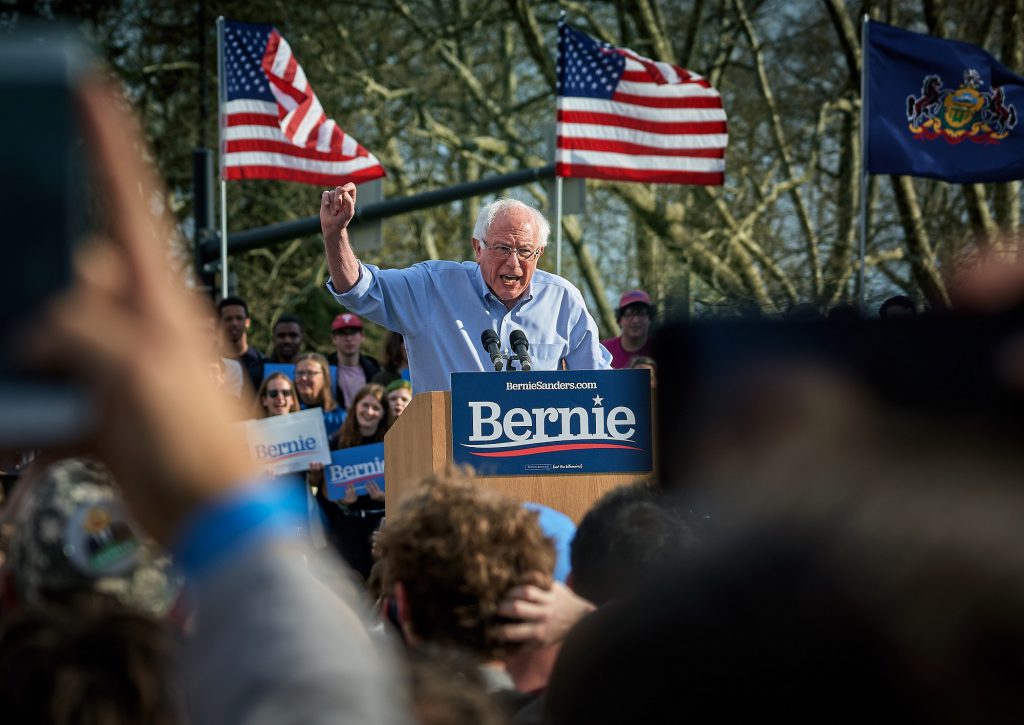
Published April 18, 2019
In 2016 and 2017, Bernie Sanders raked in over a million bucks. Last year, his gross income was down to $561,293 — still not too shabby. The point is not to rib the senator about his membership in the top 1 percent, though that’s tempting. Nor is it to chide him for his relatively paltry charitable donations. His contributions to charity represented only 3.4 percent of his income, it’s true, but compared with some of his competitors in the Democratic field, that was generous. Beto O’Rourke reportedly contributed only one-third of one percent of his 2017 income ($370,412), and he may have underpaid his taxes by $4,000 by taking medical deductions in excess of the permitted amount. Amy Klobuchar, Kamala Harris, and Kirsten Gillibrand all gave less than 2 percent of their incomes away. Cory Booker and Pete Buttigieg have yet to release their tax returns, and of course President Trump is hiding behind a spectral audit (still not complete, three years on?) that in any case would present no legal obstacle to disclosure. Why he is hiding his “beautiful” tax returns is up to the imagination.
The question for Bernie Sanders is: How can you sleep at night knowing that you became rich at the expense of the middle class and the poor?
“But I didn’t,” he would doubtless protest. “I made my money by selling thousands of copies of Our Revolution.” Speaking on Fox News, he was defiant: “If anyone thinks I should apologize for writing a bestselling book, I’m sorry, I’m not going to do it.”
But he should apologize, according to his own logic. How many times has Bernie Sanders alleged that “millionaires and billionaires” are siphoning off all of the nation’s wealth and hoarding it for themselves? Here’s a typical example from a 2015 interview with the Des Moines Register:
Is it right that the middle class continues to disappear while there has been a massive transfer of wealth from working families to the top one-tenth of 1 percent? Trillions of dollars in the last 30 years have flowed from the middle class to the top one-tenth of 1 percent. And the American people say, ‘No, that’s not right.’
It’s also not true. Not remotely. Millionaires and billionaires acquire wealth by producing products and services that other people want to buy, from computers to Greek yogurt to bad books like Our Revolution. Sure, some millionaires and billionaires are born into wealth, but even they haven’t subtracted from the net worth of any other American. In fact, the rich tend to improve the lives of other Americans by 1) providing them with jobs, and 2) buying the products they manufacture, and 3) paying high taxes, and 4) contributing generously to charities (well, most rich people anyway, not presidential contenders).
As for Sanders’s notion that we have witnessed a “transfer of wealth from working families to the top one-tenth of 1 percent” — this is gibberish. How did that transfer happen? Were working families taxed heavily and the tippy-top one percenters excused? In that case, though it would be wrong to call it a transfer of wealth (the money wasn’t being deposited in Bill Gates’s account), it would amount to the rich being free riders when it comes to enjoying the goods of government including national defense, roads, food inspection, and so forth.
But, of course, that’s fantasy. As the Tax Foundation reports, in 2016 the top 1 percent earned 19.7 percent of total national income and paid 37.3 percent of income taxes. We have progressive tax rates, so the top 1 percent paid average taxes of 26.9 percent, which is seven times higher than taxpayers in the bottom half of the income distribution.
As the for the “shrinking middle class” Senator Sanders is always lamenting, it is shrinking, but only because so many more Americans are joining the upper class. If “middle class” is defined as households between two-thirds and twice the median household income, then the percentage has declined from 61 percent in 1971 to 50 percent in 2015. As Mark Perry of the American Enterprise Institute notes, those people can go only one of two places: up or down. Most of those who are no longer in the middle class are in the upper class (though some fell below as well). In 1969, fewer than one out of twelve households earned $100,000 or more. By 2016, 27.7 percent were in that category. Politicians thrive on stories of decline and victimization, but the story of the past few decades — despite ups and downs — is one of increasing national wealth.
Bernie Sanders is a one-percenter. If his wealth is tainted, it isn’t because he siphoned it from others, but because he earned it by peddling twaddle.
© 2019 Creators.com
Mona Charen is a senior fellow at the Ethics and Public Policy Center.








